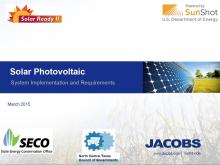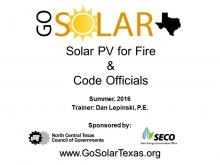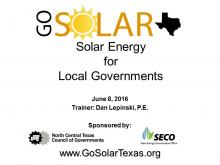The following resources are meant to educate and assist inspectors, firefighters, and code officials to the relevant issues surrounding solar PV systems.
Common Code Violations
Solar thermal and PV systems are addressed in the 2015 International Fire Code, the 2015 International Building Code, the 2015 International Residential Code, and the NFPA 70 2017 National Electrical Code. Common code violationsfor inspectors and code officials to be aware of include:
-
Sloppy workmanship
-
Wire management (exposed wires need proper support)
-
Equipment not installed to listing (circuit breaker or fuse w/ incorrect amperage rating per NEC 690.8)
-
NEMA 3R rating for equipment located outdoors (most 3R enclosures are rated for vertical installations only, use 4R for horizontal)
-
UL listed Combiner Boxes only (no “site-made” combiner boxes!)
-
Point of Connection (2011 NEC now requires PV breaker in main panel to be located at opposite end of bus bar from the main circuit breaker location)
-
Labeling –Important but commonly overlooked
-
“Direct Current Photovoltaic Power Source” on DC Disconnect
-
-
Articles 690 and 705 require labels which specifies “a permanent plaque or directory providing the location of the service disconnecting means and the photovoltaic system disconnecting means, if not located at the same location.” This isn’t so much a label as it is a map.
-
Label material and attachment. The 2008 and 2011 NEC require permanent labels—many installers use plastic or metal engraved signs. When plastic is used, it should not be placed in direct sunlight
-
Grounding -The requirements for equipment grounding and system grounding are separate and need to be evaluated separately.
-
The NEC is very clear: “Exposed non–current-carrying metal parts of module frames, equipment, and conductor enclosures shall be grounded…regardless of voltage.” The grounding method accepted industry-wide is to attach a tinned copper lay-in lug to each module and rack member, with an appropriately sized ground conductor bonding each of the modules and racks together.
-
System Grounding -Section 690.47 deals specifically with system grounding. This section was completely rewritten in the 2008 Code, and again in 2011 resulting in a number of differing opinions and methodologies.
-
Wire Color Coding -If the conductor is a grounded circuit conductor, the insulation must be white or gray. If the conductor is an equipment-grounding conductor, it must have green insulation or be bare.
-
Those color codes apply to both AC and DC electrical systems. There is no special color code for DC systems. PV installers insisting that red is positive and black is negative are incorrect!
Visit the Solar America Board for Codes and Standards at www.solarabcs.org for more information!
Training and Webinars
Solar Inspector Training
Topics include Solar PV basics, installation, inspection, code violations, grounding/sizing/labelling, financial analysis, and a case study presentation on the DFW airport solar installation.
Taught by Tony Kingman, R.A. from Jacobs Engineering.
Solar PV for Fire and Code Officials
Fire Inspectors will learn about applicable fire codes and methods for implementing code requirements in residential and commercial photovoltaic (PV) systems.
Topics include:
- Components of a solar energy system
- Types of solar energy systems
- Misconceptions about solar energy systems
- Safety labeling for firefighters
- Firefighter concerns
- Inspecting systems for code compliance
- Changes coming in the 2017 National Electric Code
Solar Energy Basics, Permit Processes, and Ordinance Development
Local government officials will gain a fundamental understanding of residential and commercial photovoltaic systems, components that comprise a system and their functional role, basic mechanical and physical characteristics of solar panels, and be provided answers to many common questions - including many you may not know what to ask.
Topics include:
- Overview of solar energy with definitions
- Economics of solar energy
- Common concerns and misconceptions
- Strategic planning for 10, 20, and 30 years
- Permitting and ordinance considerations
- Expedited permitting
Frequently Asked Questions
Click here to view fire and code FAQs!



